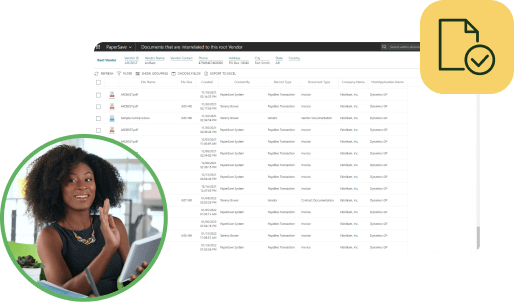On-premises document management is quickly becoming a thing of the past. Today, companies are moving to cloud-based document management systems (DMS) due to all of the benefits: cuts costs, increase efficiency, and enables anytime, anywhere access to documents.
To achieve these benefits, however, there are some crucial things to keep in mind.
Business requirements
It’s important to have a clear understanding of your business goals and objectives before moving to the cloud. Start by pinpointing your organization’s biggest issues regarding document management, and define what features, storage space, and services you need to overcome them.
Knowing this will help you make informed decisions early on. For example, if your company suffers from slow invoicing, then a cloud DMS powered with artificial intelligence, workflow automation, and full text search features may be the solution.
Cloud readiness
The next step is to figure out if your infrastructure is prepared for cloud DMS. This involves checking whether your business applications—like accounting and customer relationship management software—are compatible with cloud DMS. If they’re not, you’ll have to configure the DMS software to work with your current systems.
Another important consideration is your network. Depending on the number of users and data your company has as well as your distance from your service provider, you’ll need a lightning-fast network to reap the benefits of the cloud.
Consult with your managed IT services provider (MSP) about how much internet bandwidth you’ll need to deploy and run cloud DMS.
Costs
While the cloud is known for its ability to reduce costs, you must keep track of the different resources involved in cloud migrations. For starters, prices may vary depending on the number of users, storage space, and features you need.
Moreover, implementations require professional support, incurring additional expenses. There are also costs for network upgrades and transferring data within a given timeframe. To estimate pricing in detail, contact your DMS provider directly.
Security
Evaluating the security of a potential cloud DMS solution is crucial. The first thing you should do is investigate whether the solution complies with industry standards.
For instance, if you’re in the healthcare sector and are planning to store electronic health records in the cloud, you’ll want a solution that’s HIPAA-certified. Meanwhile, a solution that meets Sarbanes-Oxley and PCI DSS standards is vital for firms that deal with financial and credit card information.
Beyond compliance certifications, look for specific security features. Your solution must at least come with advanced threat prevention software, encryption systems, multifactor authentication, and account access controls.
It’s also a good idea to partner with a company that offers proactive monitoring services to keep your data out of harm’s way.
Employee training
Adopting cloud DMS means exposing your staff to a completely new environment, which requires training. This training should give employees ample time to get acquainted with the new system and cover how the cloud will transform current workflows and internal processes.
If you have remote work policies, make sure to create specific onboarding procedures for using mobile DMS.
Also, consider how different departments will use cloud DMS. Accounts payable will likely need a specialized training curriculum regarding invoicing workflows, while human resources will need lessons on document capture and payroll workflows.
Cloud DMS provider
Working with the right cloud DMS provider can make a world of difference. That’s why it’s important to thoroughly vet your provider before migrating to any cloud service. Most providers are judged solely on their reputation, but extensive industry experience is also important. After all, you’re much more likely to achieve success with a provider that understands the most common issues within your industry sector.
Other indicators of a good provider can be found in their service level agreements (SLAs). If they’re able to guarantee unfailing availability of their services, swift issue response and resolution times, and proactive monitoring, you’ve found yourself a partner.
Working with a cloud DMS provider like PairSoft will make your transition to the cloud seamless and pain-free. From planning to execution, our support engineers will give you expert advice throughout the entire process. We also provide comprehensive support and security for all our clients. Call us or sign up for our free demo today to learn more.







